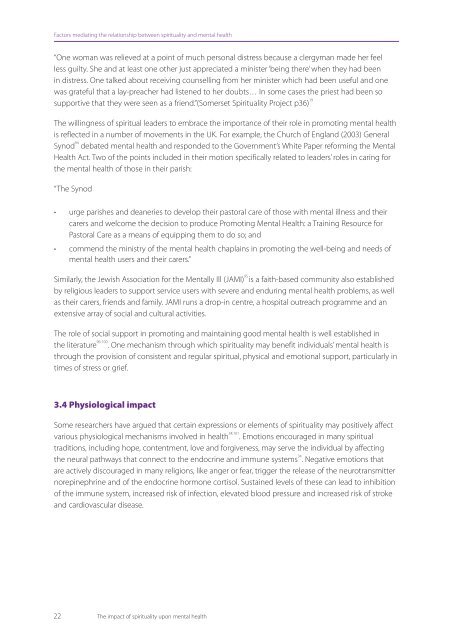The Gift of Spirituality
The Gift of Spirituality
The Gift of Spirituality
You also want an ePaper? Increase the reach of your titles
YUMPU automatically turns print PDFs into web optimized ePapers that Google loves.
Factors mediating the relationship between spirituality and mental health<br />
3.2 Locus <strong>of</strong> control / attributions<br />
One <strong>of</strong> the ways in which an individual makes sense <strong>of</strong> the world is the way in which they interpret and<br />
give meaning to events or experiences. Proposed causes – or attributions – for events have long been<br />
considered important mediators <strong>of</strong> mental health, and research exploring the association between<br />
attributional style and various mental health problems still flourishes today 11;47;82-87 . Perceiving negative<br />
events as externally caused and positive events as internally caused is widely regarded as an ‘optimistic’<br />
attributional style and is generally associated with better mental health, in comparison to individuals<br />
with the opposite attributional style 34 . Similarly, an internal locus-<strong>of</strong> control – whereby an individual<br />
believes that they have some power over a given outcome – is usually associated with better mental<br />
health than an external locus <strong>of</strong> control 84 .<br />
One review <strong>of</strong> the literature has suggested that religious beliefs may allow a person to reframe or<br />
reinterpret events that are seen as uncontrollable 22 , in such a way as to make them less stressful or<br />
more meaningful. For example, some religious traditions that believe in the concept <strong>of</strong> an all-powerful,<br />
all-controlling God would encourage an individual who didn’t get a job that they had really hoped for<br />
that “it wasn’t God’s will”. This could reframe a situation in which an individual might otherwise blame<br />
themselves or feel disempowered through a lack <strong>of</strong> control. Attributing negative events to forces<br />
outside <strong>of</strong> oneself may also lead to a more optimistic attributional style. Indeed, one study showed that<br />
the more fundamental the religious beliefs <strong>of</strong> an individual, the more likely they were to be ‘optimistic’<br />
– that is, that negative events are “God’s will” (rather than anyone’s fault), and positive events are a<br />
reward or consequence <strong>of</strong> “obedience” or “good” behaviour 88 . As mentioned earlier, this attributional style<br />
may help some individuals to make sense <strong>of</strong> the suffering associated with a mental health problem.<br />
<strong>The</strong> interaction <strong>of</strong> spiritual, cognitive and emotional factors will probably contribute to an individual’s<br />
likelihood <strong>of</strong> interpreting suffering in this way.<br />
On occasions, some forms <strong>of</strong> spirituality can encourage an attributional style that is damaging for<br />
mental health, especially for those who are already vulnerable to mental ill health. For example, some<br />
strands <strong>of</strong> fundamentalist Christianity have regarded mental illness as the “work <strong>of</strong> the devil” requiring<br />
demons to be “delivered” from a person’s body 72;89 . Although most Christian churches aim to be<br />
compassionate and understanding, service users still occasionally find a lack <strong>of</strong> both virtues in some<br />
settings:<br />
“…I don’t think anybody in their right mind would label themselves as psychotic; it’s like labelling<br />
yourself as a criminal or anti-Christ…” (Somerset <strong>Spirituality</strong> Project, 2002, p45) 19<br />
Although in the main, a lack <strong>of</strong> understanding within religious organisations is due to confusion or<br />
uncertainty concerning the causes and contributions to mental health problems, some traditions<br />
interpret negative events as a consequence <strong>of</strong> “sin” or God’s judgment 89;90 . This leads to an internal and/<br />
or uncontrollable attributional style, which may help to explain why increased anxiety is <strong>of</strong>ten found<br />
amongst those with a strict religious upbringing 59 or those with a guilt- or punishment-based view <strong>of</strong><br />
God 22 .<br />
20<br />
<strong>The</strong> impact <strong>of</strong> spirituality upon mental health

















